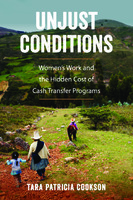Unjust Conditions
Women's Work and the Hidden Cost of Cash Transfer Programs
Abstract
Unjust Conditions follows the lives and labors of poor mothers in rural Peru, richly documenting the ordeals they face to participate in mainstream poverty alleviation programs. Championed by behavioral economists and the World Bank, conditional cash transfer (CCT) programs are praised as efficient mechanisms for changing poor people’s behavior. While rooted in good intentions and dripping with the rhetoric of social inclusion, CCT programs’ successes ring hollow, based solely on metrics for children’s attendance at school and health appointments. Looking beyond these statistics reveals a host of hidden costs for the mothers who meet the conditions. With a poignant voice and keen focus on ethnographic research, Tara Patricia Cookson turns the reader’s gaze to women’s care work in landscapes of grossly inadequate state investment, cleverly drawing out the tensions between social inclusion and conditionality.
Keywords
peru; behavioral economics; development; poverty; rural; gender; inclusion; conditional cash transfer; ethnography; Cajamarca; Care work; LimaDOI
10.1525/luminos.49ISBN
9780520969520OCN
1035557669Publisher
University of California PressPublisher website
https://www.ucpress.edu/Publication date and place
Oakland, 2018Classification
Development studies
General and world history
Gender studies, gender groups


 Download
Download Web Shop
Web Shop